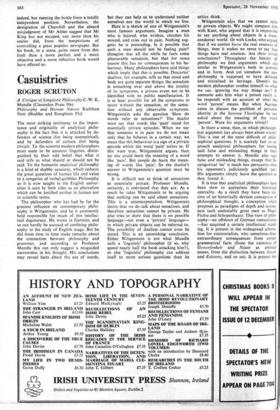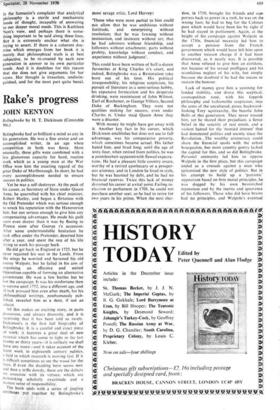Casuistries
ROGER SCRUTON
A Critique of Linguistic Philosophy C. W. K. Mundle (Clarendon Press 50s) Philosophy and Human Nature Kathleen Nott (Hodder and Stoughton 55s) The most striking testimony to the impor- tance and originality of analytical philo- sophy is the fact that it is attacked by de- fenders of science (for being unempirical), and by defenders of culture (for being trivial). To the scientist modern philosophers must seem to be amateur linguists, distin- guished by their odd belief that what is said tells us what should or should not be said. To the humanist analytical philosophy is a kind of shabby casuistry, which reduces the great questions of human life and value to a congeries of verbal quibbles. Philosophy as it is now taught in the English univer- sities is seen by both sides as an aberration which can be justified neither in human nor in scientific terms.
The philosopher who has had by far the greatest influence on contemporary philo- sophy is Wittgenstein, and he is commonly held responsible for much of this intellec- tual degeneracy. He wrote in German, and so can hardly be accused of confining philo- sophy to the study of English usage. But he did from time to time make remarks about the connection between philosophy and grammar, and according to Professor Mundle this can only suggest a misguided narrowness in his thought. His conclusions may reveal facts about the use of words, but they can help us to understand neither ourselves nor the world in which we live.
Here is a sketch of one of Wittgenstein's most famous arguments. Imagine a man who is injured, who writhes, clutches his wound, and cries out in pain. Nothing sug- gests he is pretending. Is it possible that such a man should not be feeling pain? (Imagine that all the while he feels some pleasurable sensation, but that for some reason this has no consequences in his be- haviour. Many philosophers have said things which imply that this is possible. Descartes' dualism, for example, tells us that mind and body are quite separate things; the sensation is something over and above the totality of its symptoms, a private event not to be identified with its public manifestation. It is at least possible for all the symptoms to occur without the sensation, or the sensa- tion without any observable symptoms. Wittgenstein asks the question 'How do words refer to sensations?' The dualist must say that words like 'pain' stand for essentially private episodes. When we say- that someone is in pain we do not mean only that he behaves in a certain way, we mean that this behaviour is a sign of a private episode which the word 'pain' refers to. If this were true, Wittgenstein argues, then no one could learn the meaning of a word like 'pain'. But people do learn the mean- ing of words like 'pain'. So -the dualist's answer to Wittgenstein's question must be wrong.
It is difficult not to think of sensations as essentially private. Professor Mundle, certainly, is convinced that they are. As a result he takes Wittgenstein to be arguing that nothing can be said about sensations. This is a misinterpretation; Wittgenstein insists that we do talk about sensations, and therefore sensations cannot be private. He also tries to show that there is no possible language—not even a `private' language— in which private objects can be referred to. The possibility of dualism cannot even be stated. This is an astonishing conclusion. Either Wittgenstein is not what Mundle calls a 'linguistic' philosopher (if so, why spend nearly half the book attacking him?), or else 'linguistic' philosophy can address itself to more serious questions than its critics think.
Wittgenstein says that we cannot refer to private objects. We might compare him with Kant, who argued that it is impossible to say anything about objects in a trans- cendental world. Or with Locke, who argued that if we cannot know the real essences of things, then it makes no sense- to—say that things have real essences. Are these trivial conclusions? Throughout the history of philosophy we find arguments which are similar to Wittgenstein's both in content and in form. And yet somehow the new philosophy is supposed to have debased and trivialised its heritage. Doesn't the modern philosopher confine himself to what we say, ignoring the way things are? 11'. someone asks him what a person really is, he responds with an account of what the word 'person' means. But when Aquinas came. to discuss the problem of personal identity in the Summa Theologiae he too asked about the meaning of the word `person'. Were his arguments trivial?
Is there a sense, then, in which philosoph- ical argument has always been about words? This is one of the most difficult of philo- sophical questions. It is scarcely fair to re- proach analytical philosophers for having said false and misleading things in their attempts to answer it. Mundle also says false and misleading. things, except that his categorical `no' is much less persuasive than his opponent's judiciously qualified 'yes'. His arguments simply leave the question as they found it.
It is true that analytical philosophers have been slow to -appreciate their historical centrality. As a result they have been vic- tims of an historically deviant conception of philosophical thought, a conception which proposes as paradigms of depth and serious- ness such undeniably great men as Hegel, Fichte and Schopenhauer. This view of philo- sophy—an offshoot of German romanticism —has acquired a certain intellectual stand- ing. It is present in the widespread admira- tion for existentialists, who sometimes draw extraordinary consequences from certain grammatical facts (from the existence of Geworfenheit and Neant as abstract nouns, from the distinction between Dasein and Existenz, and so on). It is present too in the humanist's complaint that analytical philosophy is a sterile and mechanistic mode of thought, incapable of answering to our deeper moral needs. This is Kathleen Nott's view, and perhaps there is some- thing important to be said along these lines. But it is extremely unclear what she is trying to assert. If there is a coherent doc- trine which emerges from her book it is merely.- that philosophical truth is at best subjective, to be re-created by each new generation in answer to its own particular needs. And it is doubtless for this reason that she does not give arguments for her views. Her thought is irresolute, undistin- guished, and for the most part quite banal.















































 Previous page
Previous page